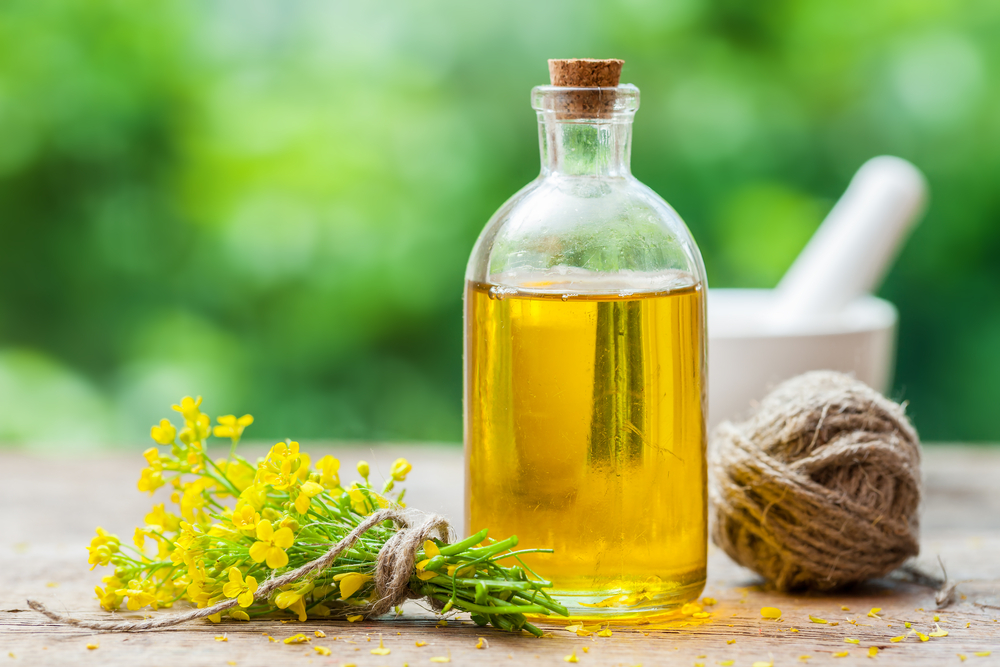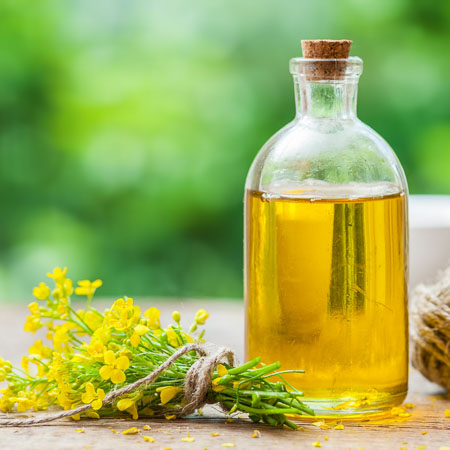Ah canola oil. If you cook and/or bake or grew up in a cooking household, chances are you probably know about canola oil. But, is canola oil vegan…and is it worth using?
Is Canola Oil Vegan?
The short answer is yes, canola oil is vegan. However, it may not align with living a cruelty-free and sustainable lifestyle.
Let me explain..

First, let’s clarify why canola oil is vegan: it does not contain any animal or animal derived products nor does canola oil’s processing method include any animal products. But what exactly is canola oil?
Canola oil comes from the rapeseed plant and was discovered in the 1970s. It is classified as a part of the mustard family. It is also light in color and more or less flavor free. However, Let’s be clear, you are not going to go dipping bread in it anytime soon. Canola oil is, however, good for cooking and baking.
How Is Canola Oil Processed?
Canola oil can be a highly refined oil, meaning it is not always the best choice for your health. Although, most oils are questionable in terms of health. Remember, oil is pure fat from its original source.
Though, how it is processed is, arguably, of greater concern. You want to look for ‘organic’ or ‘cold-pressed’ labeling. Otherwise, you are buying a much more refined oil.

With canola oil, there are three major steps to processing: pressing, extracting, and refining. First, the seeds are heated and pressed. From there, a solvent (a chemical compound used to dissolve something) is added to extract the oil from the pressed seeds.
Next, the oil is refined to remove any taste, odor, coloring etc. This process often raises an oil’s smoke point (the point at which oil begins smoking during cooking), which allows oils to be cooked at higher temperatures, but also removes a lot of the nutrients.
Read Next: The Horrific Impact Of Palm Oil
Ultimately, cold-pressed extraction is better because it does not subject oils to a high amount of heat or heavy refining allowing the oils to retain more nutrients.
Is Canola Oil Healthy?
Not to worry, canola oil is not all bad. In fact, here are some great things about canola oil: the saturated fat content is relatively low (saturated fats are unhealthy and known for raising your LDL [bad] cholesterol).
According to a Harvard study, canola oil also has a fairly high amount of omega-3 fatty acids (these are the fatty acids we have to get from food that help lower inflammation and reduce the risk of things like heart disease, Alzheimer’s, and dementia).
*Quick note: Help keep our site ad-free by checking out our vegan merch store. We appreciate your support <3*
Conversely, canola oil is high in omega-6 fatty acids. You want to consume both omega-3s and omega-6s, but you want a higher amount of omega-3 than omega-6. Too much omega-6 can actually have adverse effects on your health and reduce the benefits of omega-3s.
Additionally, canola oil is heavily refined and most crops that canola oil originates from are genetically modified (GMO). This is where the argument for using less refined oils can be made.
For example, extra virgin olive oil, avocado oil, even coconut oil in some cases might be a better option depending on the dish and how often you are using oil. For these oils, cold-pressed is best. Look for non-GMO and organic too. But do be careful with coconut oil, as it is very high in saturated fats.
Check out our delicious oil-free vegan artichoke spinach dip recipe!
Summary
So, let’s reflect for a moment. Canola oil is far from the worst thing you can be eating on a regular basis. Which is good, because you will find this oil in a lot of foods. Processed foods, plant-based or otherwise, frequently contain canola oil.
Also, it makes a good replacement for eggs in certain plant-based baked goods. For example, you might find it in vegan mayonnaise, vegan sweets (i.e. brownies, cakes, cookies), vegan tacos (using canola oil to cook your veggies and meat substitutes in) etc. There are many uses for canola oil given that is basically odorless and tasteless in a dish.
So, to recap. Canola oil is not the best oil on the market, but it is far from the worst. Additionally, it is a good plant-based oil you can find relatively cheap and made with decent ingredients. Don’t shy away from giving this oil a try!
Want to learn more? Read our vegan jelly belly guide, then find out why Oreos might not be as vegan as you think.


